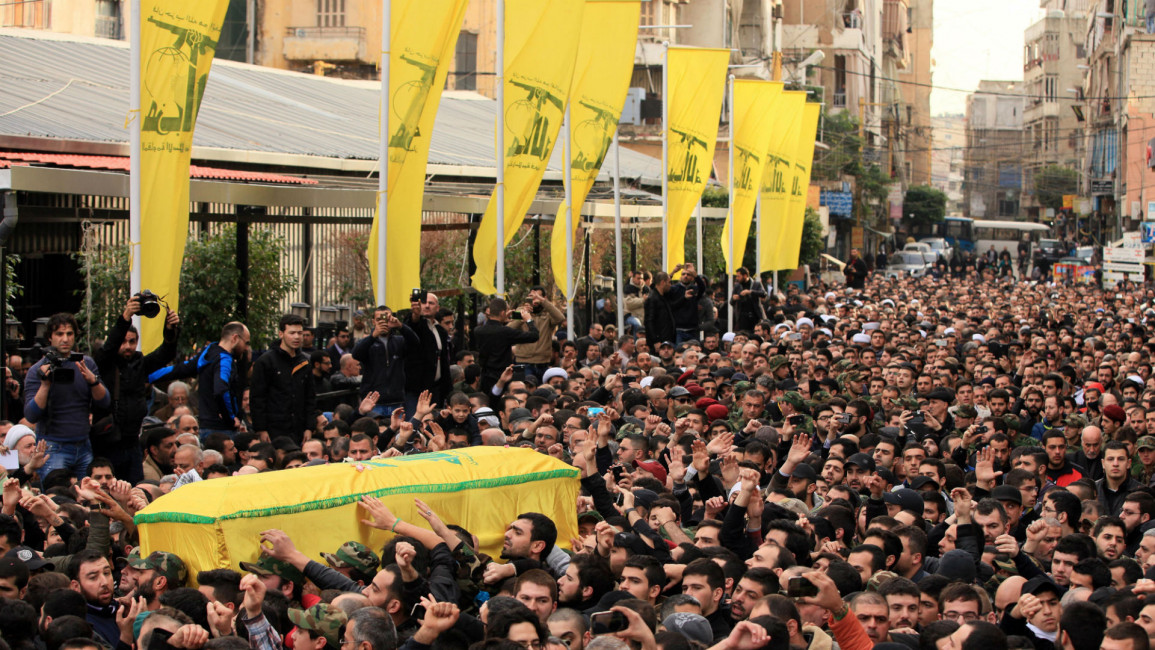Israel boosts defence as Hizballah buries its dead
Israel was on high alert Tuesday for possible retaliatory attacks by Hizballah, the Lebanon-based group, following the Israeli air raid that killed at least six fighters inclduing a senior Iranian general on the Syrian controlled side of the Golan Highets.
Israel has boosted deployment of its "Iron Dome" anti-missile aerial defence system along its northern border with Lebanon and Syria, and has increased surveillance activities in the area, the officials said, speaking on condition of anonymity.
Israel's Security Cabinet is scheduled to meet to discuss a potential escalation in violence, they said.
Hizballah claims Israel carried out Sunday's strike on the Syrian side of the Golan Heights, which killed senior Iranian general Mohammad Ali Allahdadi and six Hizballah members, including top commanders Mohammad Issa and Jihad Mughniyeh.
The latter was the son of Imad Mughniyeh, a revered, top-ranking Hizballah commander assassinated in 2008 in Damascus in a bombing that Hizballah says was carried out by Israel's secret services. He is the most prominent Hizballah figure killed in Syria since the Shia group joined the conflict in 2012, fighting alongside President Bashar Assad's forces.
Issa was responsible for Hizballah's operations in Syria and Iraq, a source within the Shia movement told AFP.
Burying the dead
Thousands of mourners marched in a funeral procession on Monday for Mughniyeh, Issa and the other fighters, chanting "Death to Israel."
The funeral took place in southern Beirut, a Hizballah stronghold. Mughniyeh was interred in the same grave as his father.
Since Syria's conflict began in March 2011, Israel has reportedly carried out several airstrikes in Syria that have targeted sophisticated weapons systems, including Russian-made anti-aircraft missiles and Iranian-made missiles, believed to be destined for Hizballah.
The last such air strike was in early December, when warplanes struck near Damascus' international airport, as well as outside a town close to the Syria-Lebanon border. Israel has not commented on its role in those strikes.
Hizballah leader Hassan Nasrallah, in an interview last week, said Hizballah reserves the right to retaliate at any time for the assassination of Mughniyeh senior.
The Syrian side of the Golan Heights
Tehran confirmed that the Israeli strike also killed an Iranian general.
"General Mohammad Ali Allahdadi and a number of fighters and Islamic Resistance (Hezbollah) forces were attacked by the Zionist regime's helicopters," said a statement on the Revolutionary Guards' website.
Iran's Foreign Minister Mohammad Javad Zarif said he "vigorously condemns" the Israeli strike that killed the younger Mughniyeh on Sunday. Zarif said the strike was no surprise, describing it as "state terrorism" by Israel.
The raid, near Quneitra on the Syrian-controlled side of the Golan Heights, enraged the group's supporters, but analysts said Hizballah would seek to avoid a major escalation with Israel. Hizballah is now deeply involved in the war in neighbouring Syria, where it backs President Bashar al-Assad.
With its forces spread thin, and little appetite in fragile Lebanon for a new conflict with Israel, analysts said Hizballah would have to find a way to respond without provoking a full-on war.
The six fighters killed on Sunday afternoon were carrying out a field reconnaissance mission in Mazraat Amal village, Hizballah's Al-Manar television said. An Israeli security source confirmed that an Israeli helicopter had carried out a strike against "terrorists" in the Golan who were allegedly carrying out an attack.
The raid raised tensions in Lebanon, with the army stepping up patrols along the so-called Blue Line, the UN-designated ceasefire line with Israel. There was no immediate comment from Hizballah officials, but the movement's Al-Manar channel branded the strike "a costly adventure that threatens the security of the Middle East".
The raid came days after Hizballah chief Hassan Nasrallah threatened to retaliate against Israel for its repeated strikes on targets in Syria.
'Israel called Hizballah's bluff'
Hizballah says its intervention in the Syrian conflict helps the struggle against Israel because the Damascus regime forms part of a "resistance axis" alongside its main regional ally Tehran.
"The repeated bombings that struck several targets in Syria are a major violation, and we consider that any strike against Syria is a strike against the whole of the resistance axis," Nasrallah said in an interview on Thursday.
He boasted that Hizballah was "stronger that we ever were as a resistance movement" and touted its sophisticated arsenal, including Fateh-110 missiles.
The missiles have a range of 200 kilometres (125 miles) or more and are capable of hitting much of Israel.
Analysts said the precision Israeli strike, just days after Nasrallah's bellicose remarks, stood to embarrass Hizballah.
"What happened is that the Israelis called Hizballah's bluff last night," said Hilal Khashan, a professor of political science at the American University in Beirut.
"Hizballah will not be able to retaliate, because if it retaliates, it will be another war. Hizballah is in Syria and it is not ready for another war against Israel."
Khashan said the movement could resort to small-scale attacks, like a roadside bomb on the ceasefire line with Israel it claimed last year, but would avoid a more serious response.
"Nasrallah will say the Israelis are trying to provoke us to help in their elections and we will not fall into their trap. That's the best they can do," he added.
In Israel, analysts made the same calculation. "Hizballah doesn’t want a full-fledged war," said Yoram Schweitzer, a former Israeli military counterterrorism chief.
"It has a number of possibilities to respond in different arenas. We assume that it currently does not want full contact," he said.
Israel occupied parts of Lebanon for 22 years until 2000 and the two countries are still technically at war.
In 2006, Israel fought a bloody war Lebanon, that killed more than 1,200 people mostly civilians, and some 160 Israelis, mostly soldiers.



